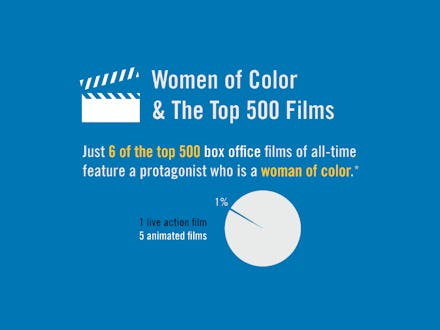Hollywood's Problem With Women of Color Is Even Worse Than You Realize

Hollywood is playing with fire. American films have a significant global cultural impact on how, what and why people think the way they do, yet Hollywood has repeatedly supported the telling of one story, and one story only: that of being white and being male.
In a new infographic, the Representation Project analyzed the top 500 films of all time based on worldwide box office numbers from Box Office Mojo, and found that just six starred a woman of color. That's 1% of the top 500 films — a startling stat that poses serious implications regarding how people of color and women are valued in society.
*Protagonist defined here as the primary character in a film's primary story line.
On the heels of one of the most significant awards seasons yet for women and people of color — John Ridley became the second black man to win an Oscar for Best Adapted Screenplay, Lupita Nyong'o the sixth black woman to win Best Supporting Actress for her work in 12 Years a Slave and Alfonso Cuarón the first Latino to win Best Director for Gravity — it might seem easy to dismiss these claims.
Lupita Nyong'o at the Academy Awards. Image Credit: AP
Yet despite these wins, Hollywood has proved itself to be ignorant — or simply uncaring — of the monumental influence American cinema has in promoting one-sided ideals of womanhood and racial identity across the world.
None of the six films starring a woman of color have cracked the top 200. Five of these films are animated (Pocahontas, Mulan, Spirited Away, Lilo & Stitch and The Princess and the Frog), and Sister Act, the sole live action film on the list, was released in 1992! That means it's been over 20 years since Hollywood really put its monetary muscle behind a film centered on a living, breathing woman of color.
Yes, I said Hollywood — not audiences. Consumer tastes are often considered to be the driving force behind which films get made, but film industry insiders are ultimately the ones who not only decide what stories get told on screen, but also which ones get the support of powerful marketing dollars to push them into the consciousness of movie-going audiences.
The lack of money — really, faith — that Hollywood funnels into promoting these films results in people all over the world not being encouraged to watch, understand and empathize with stories about women of color.
Films made with Hollywood's stamp of approval win big at the box office, despite their frequently egregious short-comings. Consider this fantastic point made by Imran Siddiquee in his write up of the Representation Project's findings: "[Last] year's The Lone Ranger ... was largely panned by critics, called racist and deemed a relative failure by almost everyone in the industry. But it still made $260 million worldwide, placing it at #386 on the all-time list. Why? The film had a budget of $215 million and was marketed by Disney, with the trailer premiering during the 2013 Super Bowl."
Audiences vote with their wallets, and by all accounts, if the top 500 grossing films do not feature a significant representation of women of color, then it could be argued that people simply do not want to see those stories being told. But these audiences can't pay to see films that they don't know exist in the first place.
The lack of money — really, faith — that Hollywood funnels into promoting these films results in people all over the world not being encouraged to watch, understand and empathize with stories about women of color. And that is simply dangerous.
As author Chimamanda Ngozi Adichie warns, the danger of telling a single story from a white, male perspective is that people outside of that experience begin to believe that their stories are less valid. But the majority of the world's population are people of color. Thirty-six percent of U.S. moviegoers are, too. Thus Hollywood's apparent refusal to support, fund and advocate for films that reflect these narratives, especially those of women of color, creates a cultural vacuum that paints a less authentic picture of humanity.
When Nyong'o accepted her Oscar, she reminded kids around the world watching at home that their dreams are valid. And when Cate Blanchett won her Oscar for Best Actress, she reminded Hollywood that films with women at the center are not "niche experiences." I can't wait for the day when speeches like these don't need to be made, but if this year's Oscars proved anything, it's that the voices of women and people of color matter, and their stories deserve to be told. It's time Hollywood listened.
Image Credit (all): The Representation Project